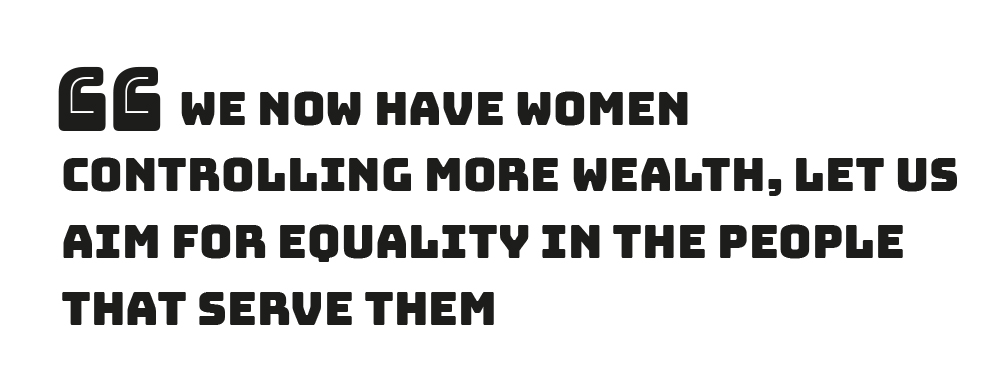Family fundamentals for the future

While The Global Family Office Report 2017 (GFOR) stops short of offering advice, the experts behind the study inevitably have their own opinions about the future of the family office sector. Here, Rebecca Gooch, research director at Campden Wealth, and Sara Ferrari, head of global family offices at UBS, share their thoughts on the risks and rewards ahead
Family offices are enjoying a relatively friendly investment climate. Many are considering how best to position themselves as the economic cycle enters a late stage and are looking to assemble the best teams.
Explored for the first time in this year’s GFOR is the number of women occupying top-tier family office roles, with researchers finding just 8% of chief executives and 13% of chief investment officers are female.
Gooch says while disappointing, this trend reflects the financial services sector, and could spell opportunity for family offices trying to attract top talent, if they are willing to invest in retention and flexibility.
 “One of the things I continually hear from female wealth holders is ‘I would like to see more women in the room, I would like to work with more women, and I would like to see more women among my advisers’.
“One of the things I continually hear from female wealth holders is ‘I would like to see more women in the room, I would like to work with more women, and I would like to see more women among my advisers’.
“We now have women controlling more wealth, let us aim for equality in the people that serve them.”
As family offices prepare for the risk of recession in the short to medium term, they are looking carefully at their asset allocations.
Ferrari says while equities are relatively expensive at the moment, they account for more than a quarter of portfolios and were at least partly responsible for the performance bounce back family offices enjoyed in 2016. The average return was 7%, compared with 0.3% the year before.
“Family offices have the ability—more than many investors—to embrace risk and illiquidity,” she says.
“With that in mind, the focus should be on maintaining a balanced portfolio that includes not only traditional assets such as equities and bonds, but also alternatives like private equity, real estate and hedge funds.”
This embracing of alternative and complex assets is yet another reason family offices need talent. There is growing interest in co-investing, and direct private equity and venture capital deals. More than 90% of family offices say they want to maintain or increase their allocations to these asset classes.
But Gooch says despite these intentions, family offices were finding it difficult to source and do due diligence on these deals, with families citing challenges including finding attractive deals and aligning with the values and objectives of partners.

A remarkable 97% source their co-investment partners through personal networks, and Gooch advises those who are struggling to actively network.
“When it comes to co-investing, the partner you choose is just as important as the investment itself, so it is important this relationship is strong from the outset.”
However, while a hot topic, private equity deals are notoriously difficult to do, and family offices need to exercise caution and ensure they have the skills required to do due diligence.
 Part of this lies in preparing and upskilling the next generation, so Ferrari says it is more important than ever for families to get the succession show on the road: 69% expect a wealth transfer to the next generation within 15 years, but less than half have a full plan in place to achieve this.
Part of this lies in preparing and upskilling the next generation, so Ferrari says it is more important than ever for families to get the succession show on the road: 69% expect a wealth transfer to the next generation within 15 years, but less than half have a full plan in place to achieve this.
“With just 30% of wealth transfers proving successful, succession planning is an existential issue for family offices,” she says.
Just 33% have written succession plans, another 15% have a verbal plan, and 30% say they have begun considering their strategy. Ferrari urges families to formalise their plans in writing.
“A verbally agreed succession plan is a step in the right direction, providing an indication that family offices are acting upon their awareness that this is a governance priority.
“However, especially in larger operations with multiple interested parties, verbally agreed plans offer less security that the family offices will stay secure in the event of disagreements and conflict between the next generation.”
And as millennials rise up through the ranks, a sea change is happening in terms of the overall objectives of investment offices, with far more focus on environmental, social, and governance (ESG) related outcomes, alongside financial returns.
“Over a quarter of family offices are engaged in impact investing already, but we expect a significant increase in momentum over the coming years. Indeed, two-fifths of family offices predict that they will increase their allocations directed towards impact and ESG investments,” Ferrari says.
Gooch says work is already getting underway on next year’s Global Family Office Report.
“We thank all of the 262 families who took part this year, our research is only as good as the participants, and we are looking forward to helping inform family offices into the future.”






